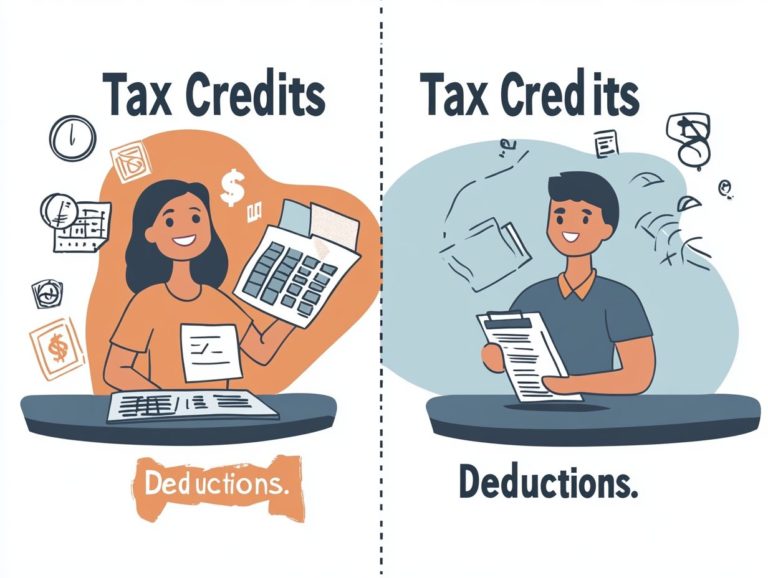How to Set Freelance Financial Goals for the New Year
Establishing financial goals as a freelancer is crucial for long-term stability and success.
The unique challenges of freelance work—like fluctuating income and varying expenses—make a clear financial roadmap essential.
This guide will help you assess your current financial situation and set realistic, measurable goals.
We will also share tips to stay motivated and navigate obstacles.
Start now and take charge of your financial future!
Contents
- Key Takeaways:
- Assessing Your Current Financial Situation
- Setting Realistic and Measurable Goals
- Creating an Action Plan
- Tracking Progress and Making Adjustments
- Staying Motivated and Focused
- Frequently Asked Questions
- 1. How do I start setting freelance financial goals for the new year, including my expected 2023 income?
- 2. What should I consider when setting freelance financial goals?
- 3. How can I stay motivated while working towards my freelance financial goals?
- 4. Should I set specific numbers for my freelance financial goals?
- 5. What are some potential pitfalls I should watch out for when setting freelance financial goals?
- 6. Should I seek professional help when setting freelance financial goals?
Key Takeaways:
- Evaluate your income, expenses, and savings to understand your financial situation.
- Set realistic and measurable goals for direction and motivation.
- Create an action plan with steps to achieve your goals and track your progress.
Why Set Financial Goals as a Freelancer?
Setting financial goals as a freelancer is vital for managing income complexities and meeting obligations like household expenses and vacations.
Having clear income goals focuses your efforts and improves decision-making in your business.
These income goals outline aspirations and milestones, allowing for accountability and progress tracking. This helps freelancers maintain a better work-life balance by keeping them motivated and dedicated to reaching their desired income.
Financial goals for freelancers vary in levels. Minimum goals typically cover essential living expenses, while stretch goals challenge personal limits. Setting both types of targets can secure a stable income while fostering personal growth and creativity in one’s work.
Involving accountability partners—people who help you stay on track with your goals—in goal-setting fosters community and support. Such relationships can motivate freelancers to enhance their service offerings and attract more clients. This not only increases income but also helps maintain long-term professional relationships, ensuring steady income while freelancers enjoy the freedom and flexibility their profession offers.
Assessing Your Current Financial Situation
The first step in setting income goals is to analyze your current financial situation. This involves reviewing your income, expenses, and savings to gain a comprehensive understanding of your financial health.
This analysis will help you identify areas that need improvement and determine which financial needs must be addressed to maintain a balanced household budget.
Evaluating Income, Expenses, and Savings
Assessing one’s income, spending, and savings is crucial in evaluating financial obligations and designing a realistic household budget. This is particularly important for freelancers, who must adapt their spending according to varying income levels.
Many individuals can simplify this process by utilizing budgeting software like Mint or YNAB. These tools enable users to track all their financial activities in one organized platform.
Categorizing expenses into fixed, variable, and discretionary types can help identify spending trends and highlight areas where reductions can be made. Regularly reviewing these categories provides a comprehensive assessment of finances and uncovers opportunities for reducing discretionary spending.
Increased awareness fosters improved financial literacy and encourages more intentional saving.
Setting Realistic and Measurable Goals
Setting realistic and measurable financial goals is essential for freelancers aiming to achieve a specific target income. This approach ensures that their aspirations align with their current abilities and prevailing market conditions.
By establishing these goals, freelancers can create a framework that allows them to break down their objectives into smaller, manageable weekly and monthly targets, promoting accountability and motivation.
Identifying Short and Long Term Goals
Setting short-term and long-term goals is essential for freelancers. Short-term goals provide immediate income, while long-term goals help you grow sustainably.
For instance, a short-term goal might be saving for a vacation. Taking periodic vacations can help restore mental energy and enhance productivity. Short-term goals also allow freelancers to develop budgeting and discipline skills. You can learn to budget better over time, and the more you practice, the more effective you become.
Long-term goals may include saving for children’s college funds or planning for retirement. Regularly saving for these long-term objectives cultivates a habit of consistent savings, leading to a more stable income stream. You can employ various strategies for long-term income planning, such as:
- Making regular contributions to a retirement account
- Establishing a college fund
- Investing in property or mutual funds that appreciate over time
Creating an Action Plan
After setting your financial goals, create an action plan. This plan outlines specific steps to reach your goals and includes timelines and tracking systems.
Steps to Achieve Your Financial Goals
To achieve your financial goals, identify specific goals, track your progress, and hold yourself accountable. Regular check-ins keep you focused and motivated.
For freelancers, the initial step is to define both your short-term and long-term financial goals. Include metrics and timeframes. These goals should adhere to the SMART criteria—specific, measurable, attainable, relevant, and time-bound.
For example, a financial goal might be to increase monthly earnings by 20% within three months or to acquire ten new clients in the next quarter.
Regular progress checks, whether on a weekly or monthly basis, allow freelancers to adjust their strategies if they are falling short. Utilizing spreadsheets or apps can help track this progress and provide a clear picture of achievements and areas needing improvement.
Establishing a system of regular check-ins fosters accountability and encourages thoughtful reflection on your financial journey.
Tracking Progress and Making Adjustments
Tracking your progress and making adjustments is crucial for your financial success! This approach enables you to evaluate your success in reaching your income targets and modify your action plan as necessary in response to changing market conditions and personal circumstances.
Tools and Strategies for Monitoring Your Finances
Use tools like budgeting apps or spreadsheets to track your finances. These tools help you manage income and expenses systematically.
In today’s digital age, integrating various financial monitoring tools can simplify this process. Popular applications like Mint, QuickBooks, and Wave offer user-friendly interfaces, enabling freelancers to categorize expenses and set budgets with ease.
By leveraging these technologies, freelancers can establish a structured planning system that not only tracks financial data but also alerts them to discrepancies or overspending.
Implementing strategies like setting regular financial review sessions or forming accountability partnerships can enhance motivation and focus. Start monitoring your finances today to pave your way to long-term success!
Staying Motivated and Focused
Freelancers frequently struggle to maintain motivation and focus on their financial goals due to challenges like fluctuating income and unexpected expenses. It is essential to develop strategies that enhance productivity to overcome these obstacles.
Tips for Maintaining Discipline and Overcoming Obstacles
Strategies for maintaining discipline while achieving financial goals include establishing clear boundaries between work and home life and creating a set work schedule. Enlisting accountability buddies—friends who help keep each other on track—can also provide valuable support.
Setting consistent work hours and designating a separate workspace can enhance focus and minimize distractions. A structured work schedule helps prioritize tasks and provides a sense of routine.
Freelancers can collaborate with creative friends as accountability buddies. By sharing their goals and reporting progress, freelancers can stay committed to their plans and tackle challenges like procrastination and burnout that may hinder their financial success.
Frequently Asked Questions
1. How do I start setting freelance financial goals for the new year, including my expected 2023 income?
To begin setting freelance financial goals for the new year, assess your current financial situation. This includes evaluating your income, expenses, and any outstanding debt.
From there, create a realistic budget and determine how much you need to earn to reach your desired financial goals.
2. What should I consider when setting freelance financial goals?
When setting freelance financial goals, it’s important to consider both short-term and long-term objectives. Short-term goals could include paying off a specific debt or saving for a major purchase.
Long-term goals may involve building a retirement fund or saving for a down payment on a house. Remember to consider your current income and expenses, as well as any potential changes in the market or your personal life.
3. How can I stay motivated while working towards my freelance financial goals?
One effective way to stay motivated is to regularly track your progress. This could include maintaining a budget spreadsheet or using a financial tracking app.
Setting smaller, achievable goals along the way can help you stay motivated and make your larger goals seem more attainable.
4. Should I set specific numbers for my freelance financial goals?
Yes, setting specific and measurable numbers for your freelance financial goals is crucial. This clarity helps create a plan to reach those goals.
For example, instead of a vague goal like “saving more money,” specify a target amount to save each month or year.
5. What are some potential pitfalls I should watch out for when setting freelance financial goals?
One potential pitfall is being too ambitious. While challenging goals are essential, setting unrealistic ones can lead to frustration and disappointment.
Regularly reassess your goals and make adjustments as necessary. Life and market changes may require you to modify your goals to stay on track.
6. Should I seek professional help when setting freelance financial goals?
It’s always a good idea to seek professional help for your finances. A financial advisor or accountant can assist in assessing your current financial situation, setting realistic goals, and creating a plan to achieve them.
They can also provide valuable advice and guidance to ensure you stay on track towards your freelance financial goals for the new year.









